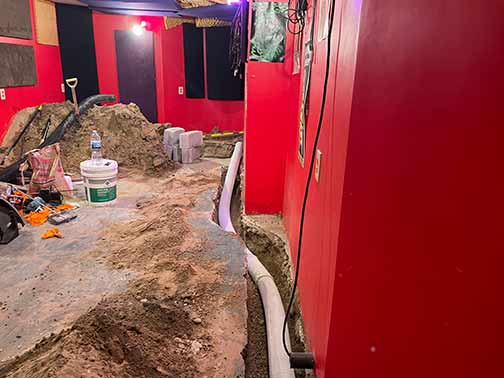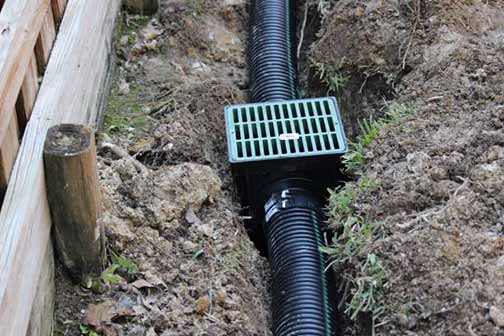
Basement waterproofing is a critical concern for homeowners in Chicago, a city known for its challenging climate. The frequent rainfall, combined with the city’s unique soil composition, often leads to water seepage and basement flooding. One of the most effective solutions to combat these issues is the installation of French drains. Below we get into the intricacies of French drains and how they provide a robust solution for basement waterproofing in Chicago.
Understanding the Basics of French Drains
French drains, also known as weeping tiles or perimeter drains, are trench systems filled with gravel or rock that contain perforated pipes. These drains are designed to redirect surface water and groundwater away from a specific area, such as a basement or foundation. The primary purpose of a French drain is to prevent water from accumulating in areas where it can cause damage, such as basements, foundations, and crawl spaces.
The Science Behind French Drains
The effectiveness of French drains lies in their design and functionality. The system works by creating a path of least resistance for water to follow. When water enters the trench, it flows through the gravel and into the perforated pipe. The pipe then channels the water away from the area, typically to a drainage ditch, dry well, or storm sewer. This process prevents water from pooling around the foundation and seeping into the basement.
Why Chicago’s Climate Demands French Drains
Chicago’s climate poses unique challenges for homeowners, particularly when it comes to basement waterproofing. The city experiences significant rainfall throughout the year, with particularly heavy downpours during spring and summer. Additionally, the freeze-thaw cycles during winter can exacerbate water infiltration issues. These climatic conditions make French drains an essential component of any comprehensive basement waterproofing strategy in Chicago.
Benefits of French Drains for Chicago Homeowners
There are numerous benefits to installing French drains in Chicago homes:
- Effective Water Management: French drains efficiently manage both surface water and groundwater, preventing water accumulation around the foundation.
- Basement Protection: By redirecting water away from the basement, French drains help prevent flooding, dampness, and mold growth.
- Foundation Preservation: Proper water management helps maintain the integrity of the foundation, reducing the risk of cracks and structural damage.
- Increased Property Value: Homes with effective waterproofing systems, including French drains, tend to have higher property values and are more attractive to potential buyers.
Types of French Drains
There are two main types of French drains that homeowners can consider:
- Interior French Drains: These are installed inside the basement along the perimeter of the foundation. They are particularly effective for addressing water infiltration issues from the ground up.
- Exterior French Drains: These are installed outside the home, around the foundation. They are designed to intercept and redirect surface water before it can reach the foundation walls.

Interior French drains are installed inside the basement along the perimeter of the foundation. They are particularly effective for addressing water infiltration issues from the ground up.
Installation Process of French Drains
The installation of French drains involves several key steps:
- Planning and Design: A thorough assessment of the property is conducted to determine the best location and design for the French drain system.
- Excavation: A trench is dug around the perimeter of the area to be protected. The depth and width of the trench depend on the specific requirements of the property.
- Gravel and Pipe Placement: A layer of gravel is placed at the bottom of the trench, followed by the perforated pipe. The pipe is then covered with more gravel to ensure proper drainage.
- Backfilling: The trench is backfilled with soil, and the surface is restored to its original condition.
- Outlet Installation: The drain pipe is connected to an appropriate outlet, such as a drainage ditch or storm sewer, to ensure proper water discharge.
Maintenance of French Drains
Regular maintenance is essential to ensure the long-term effectiveness of French drains. Homeowners should periodically inspect the drain system for any signs of blockage or damage. It is also important to keep the surface of the drain free from debris and vegetation that could impede water flow. In some cases, professional hydro jetting may be necessary to remove accumulated sediment and ensure optimal performance.
Common Issues and Solutions
While French drains are highly effective, they can sometimes encounter issues that require attention:
- Clogging: Over time, sediment and debris can accumulate in the drain pipe, leading to clogs. Regular maintenance and professional cleaning can help prevent and resolve this issue.
- Improper Installation: If a French drain is not installed correctly, it may not function as intended. Hiring experienced professionals for installation can help avoid this problem.
- Damage to Pipes: Tree roots and ground movement can cause damage to the perforated pipes. Regular inspections can help identify and address such issues before they become major problems.
Choosing the Right Professional for French Drain Installation
Installing a French drain is a complex task that requires expertise and experience. Homeowners should carefully select a reputable contractor with a proven track record in basement flooding solutions. Key factors to consider when choosing a professional include:
- Experience and Expertise: Look for contractors with extensive experience in installing French drains and a deep understanding of local soil and climate conditions.
- References and Reviews: Check references and read reviews from previous clients to gauge the contractor’s reliability and quality of work.
- Licensing and Insurance: Ensure that the contractor is properly licensed and insured to protect against potential liabilities.
- Detailed Proposal: Request a detailed proposal that outlines the scope of work, materials to be used, and the estimated timeline and cost.
Cost Considerations for French Drains
The cost of installing a French drain can vary based on several factors, including the size and complexity of the project, the type of materials used, and the contractor’s rates. On average, homeowners can expect to pay between $5,000 and $15,000 for a comprehensive French drain system. While this may seem like a significant investment, the long-term benefits of effective basement waterproofing far outweigh the initial costs.

Homeowners who invest in French drains can enjoy peace of mind, knowing that their basements are safeguarded against the city’s frequent rainfall and harsh weather conditions.
Conclusion: The Ultimate Solution for Basement Waterproofing in Chicago
French drains offer a reliable and effective solution for basement waterproofing in Chicago’s challenging climate. By efficiently managing water flow and preventing basement flooding, these systems help protect homes from water damage and maintain the integrity of the foundation. Homeowners who invest in French drains can enjoy peace of mind, knowing that their basements are safeguarded against the city’s frequent rainfall and harsh weather conditions. With proper installation and maintenance, French drains can provide long-lasting protection and significantly enhance the value of a property.
—
Interested in having an interior or exterior French drainage system installed in or around your property? We can help! Contact today at 773-599-9181 or by form below: